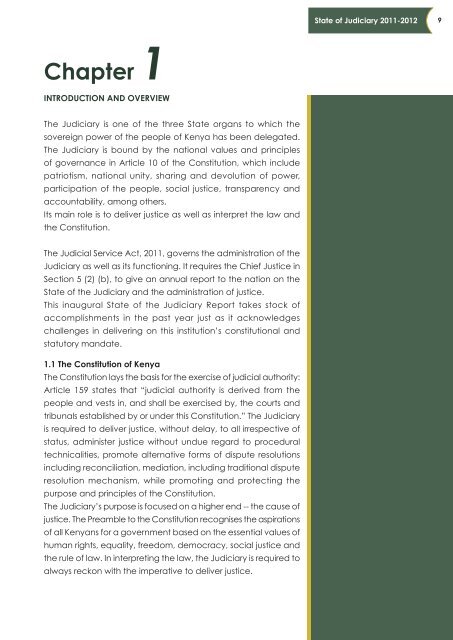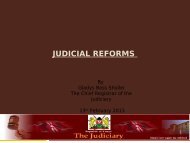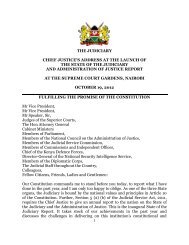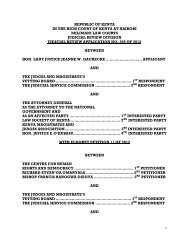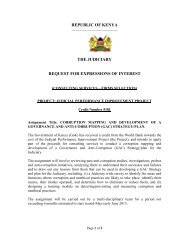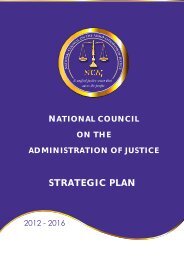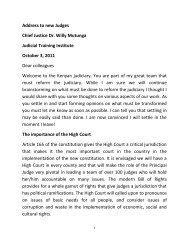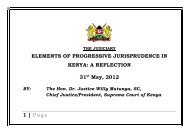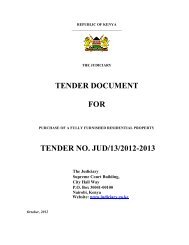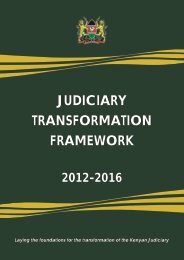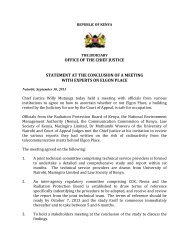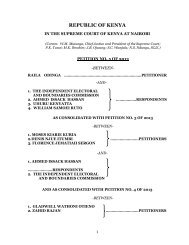Download PDF - The Judiciary
Download PDF - The Judiciary
Download PDF - The Judiciary
Create successful ePaper yourself
Turn your PDF publications into a flip-book with our unique Google optimized e-Paper software.
State of <strong>Judiciary</strong> 2011-2012<br />
9<br />
Chapter 1<br />
INTRODUCTION AND OVERVIEW<br />
<strong>The</strong> <strong>Judiciary</strong> is one of the three State organs to which the<br />
sovereign power of the people of Kenya has been delegated.<br />
<strong>The</strong> <strong>Judiciary</strong> is bound by the national values and principles<br />
of governance in Article 10 of the Constitution, which include<br />
patriotism, national unity, sharing and devolution of power,<br />
participation of the people, social justice, transparency and<br />
accountability, among others.<br />
Its main role is to deliver justice as well as interpret the law and<br />
the Constitution.<br />
<strong>The</strong> Judicial Service Act, 2011, governs the administration of the<br />
<strong>Judiciary</strong> as well as its functioning. It requires the Chief Justice in<br />
Section 5 (2) (b), to give an annual report to the nation on the<br />
State of the <strong>Judiciary</strong> and the administration of justice.<br />
This inaugural State of the <strong>Judiciary</strong> Report takes stock of<br />
accomplishments in the past year just as it acknowledges<br />
challenges in delivering on this institution’s constitutional and<br />
statutory mandate.<br />
1.1 <strong>The</strong> Constitution of Kenya<br />
<strong>The</strong> Constitution lays the basis for the exercise of judicial authority:<br />
Article 159 states that “judicial authority is derived from the<br />
people and vests in, and shall be exercised by, the courts and<br />
tribunals established by or under this Constitution.” <strong>The</strong> <strong>Judiciary</strong><br />
is required to deliver justice, without delay, to all irrespective of<br />
status, administer justice without undue regard to procedural<br />
technicalities, promote alternative forms of dispute resolutions<br />
including reconciliation, mediation, including traditional dispute<br />
resolution mechanism, while promoting and protecting the<br />
purpose and principles of the Constitution.<br />
<strong>The</strong> <strong>Judiciary</strong>’s purpose is focused on a higher end -- the cause of<br />
justice. <strong>The</strong> Preamble to the Constitution recognises the aspirations<br />
of all Kenyans for a government based on the essential values of<br />
human rights, equality, freedom, democracy, social justice and<br />
the rule of law. In interpreting the law, the <strong>Judiciary</strong> is required to<br />
always reckon with the imperative to deliver justice.


